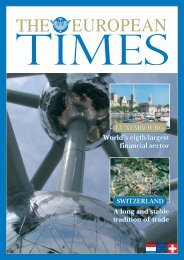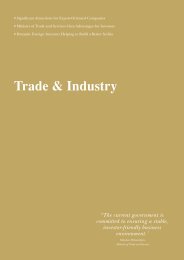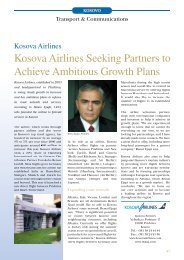Download Switzerland Report - The European Times
Download Switzerland Report - The European Times
Download Switzerland Report - The European Times
Create successful ePaper yourself
Turn your PDF publications into a flip-book with our unique Google optimized e-Paper software.
SWITZERLAND<br />
Shipping on the Rhine<br />
<strong>The</strong> Port of Basel handles around 3 million tons of<br />
petroleum product imports per year and around 1.5<br />
million tons of iron and steel products, as well as liquid<br />
bulk cargo, agricultural products, powder and granulates,<br />
food concentrates, raw building materials, gravel<br />
and sand, machine parts, and oversized goods such as<br />
ships and vehicles. <strong>The</strong> port offers modern multimodal<br />
facilities (including storage facilities for all types<br />
of products) and has speedy connections to water, rail,<br />
air and road networks. As Hans-Peter Wessels points<br />
out, “<strong>The</strong> Port of Basel is a hub of diverse investment<br />
and economic activity, and the canton plans to<br />
expand the port to further enhance connections for<br />
key logistics companies and investors.”<br />
Unique tri national airport<br />
Basel also offers access to Basel-Mulhouse-Freiburg<br />
International Airport (EuroAirport), which is located<br />
on French soil around 4 km from Basel and operated<br />
jointly by <strong>Switzerland</strong>, France and Germany, all of<br />
which have access to the airport without any customs<br />
or border restrictions. <strong>The</strong> airport handles over 4.2<br />
million passengers and 107,000 tons of freight per<br />
year and has become a key transport centre for such<br />
diverse cargo as chemicals and pharmaceuticals, high<br />
tech products, automobile parts and perishable goods.<br />
<strong>The</strong> airport’s cargo handling area has the capacity to<br />
handle 150,000 tonnes of freight per year.<br />
EuroAirport aims to expand to keep up with growing<br />
demand. <strong>The</strong> new development will be accessible<br />
by both French and Swiss road networks and will<br />
have a Franco-Swiss customs office. <strong>The</strong> expansion<br />
will enhance the airport’s attractions as a base for<br />
transport and logistics firms; 70 logistics companies<br />
already operate there, including four express mail/<br />
parcel services and three airline assistance agents.<br />
Hub of major rail lines and road corridors<br />
Basel is also a key <strong>European</strong> hub for road and rail<br />
transport. <strong>The</strong> German, French and Swiss motorway<br />
systems link up in Basel, and commercial vehicles can<br />
be loaded onto trains at the Basel border to travel<br />
across <strong>Switzerland</strong> on the ‘rolling highway’.<br />
Basel is also on the major railway line between Paris<br />
and Zurich, and is the most important rail junction in<br />
the Jura region and one of the busiest in Europe. <strong>The</strong><br />
inauguration of the TGV Est Européen (high speed<br />
Eastern <strong>European</strong> train line) in mid 2007 slashed<br />
travel times by rail between Basel and Paris, Zurich,<br />
Frankfurt and Munich.<br />
Basel is also located on the Antwerp/Basel-Lyon<br />
rail freight corridor (<strong>European</strong> Corridor C), which<br />
passes through Belgium, Luxembourg, France and<br />
<strong>Switzerland</strong> to link Antwerp, one of Europe’s largest<br />
ports, to leading <strong>European</strong> industrial centres. <strong>The</strong><br />
<strong>European</strong> Commission’s objectives for this corridor<br />
are to increase the volume transported by 55% by<br />
2020, with a reduction in transport time of 15%. <strong>The</strong><br />
EC’s goal is to encourage shippers to choose rail<br />
rather than road transport on this busy route.<br />
Basel also has a good, convenient and affordable<br />
public transportation system and has projects in the<br />
works to upgrade and expand its parking facilities.<br />
Hans-Peter Wessels says that his goal is “to improve<br />
possibilities for parking in the city for inhabitants,<br />
visitors, clients and businesses.” Around 10,000<br />
un-marked parking spaces will be transformed into<br />
marked and regulated parking to “bring about<br />
improvements in business activities and employment,”<br />
he says.<br />
Supportive environment for logistics<br />
companies<br />
Many international logistics firms have operations in<br />
Basel. Major logistics enterprise Agility, for example,<br />
transferred its <strong>European</strong> headquarters to Basel to<br />
take advantage of the canton’s highly supportive<br />
business environment as well as its exceptional infrastructure.<br />
Basel offers a pro-business government,<br />
skilled human resources, and a well-established<br />
cluster of transport and logistics services providers,<br />
and exceptional quality of life.<br />
As Hans-Peter Wessels points out, “What makes Basel<br />
a special area is its international appeal. Basel is<br />
adjacent to France and Germany, and a very significant<br />
portion of its working population is composed<br />
of immigrants who add to the canton’s cultural and<br />
business diversity. Basel has a very open culture that<br />
is receptive to new people and new ideas, and this<br />
has been one of the contributing factors towards its<br />
rapid growth.” As a base for transport and logistics<br />
companies, Basel – Europe’s logistics hub – has it all.<br />
56














